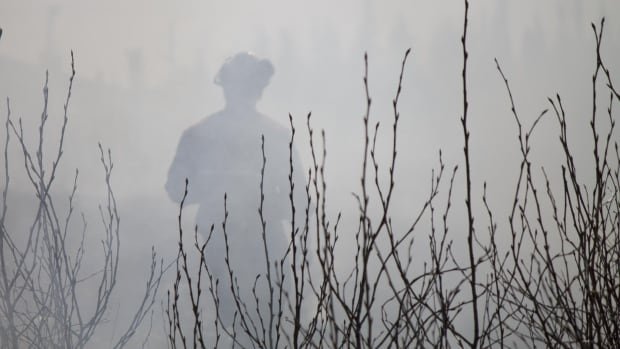A manager with Ontario’s Ministry of Natural Resources and Forestry (MNR) says work is underway to develop a formal program that addresses a joint health and safety committee’s concerns over forest firefighters’ exposure to smoke, but a union head remains doubtful.
MNR general manager Stephanie Maragna was responding to a recommendation filed in January by the committee, which asked the province to do more to inform, educate and protect forest firefighters against toxin exposure.
CBC has obtained a copy of Maragna’s response — that there will be a “formal program to appropriately address the concerns associated with smoke exposure.”
She also thanked the committee for raising concerns, but didn’t provide details on when the program will be ready or what it will include.

I’m by no means hopeful, because if they [MNR] had something, wouldn’t they have given us something more than a few sentences?.– Noah Freedman, OPSEU Local 703 vice-president
Noah Freedman is a vice-president of Local 703 of the Ontario Public Service Employees Union (OPSEU) and a forest fire crew leader with the MNR.
Freedman worries Maragna’s response means any changes won’t come in time for the next forest fire season.
“I’m by no means hopeful, because if they had something, wouldn’t they have given us something more than a few sentences?” he asked.
“All we want is for them to recognize the carcinogenic and toxic properties of forest fire emissions, and educate their workforce about those toxins.”
The health, safety and wellness manual the MNR gives to forest firefighters includes these safety practices to help reduce smoke exposure:
- Work the fire upwind from the smoke.
- Remove oneself from the smoke during rest breaks.
- Flush eyes with clean water.
- Stay low to the ground.
- Cover the face with a dry bandana.
- Move to areas where smoke isn’t as dense.
Freedman said it’s concerning the manual does not refer to medical literature that links firefighting with higher incidences of cancer.
“If the government says try your best to stay upwind, well to what degree am I going to try and make that happen if I don’t truly realize how bad the smoke is for me?”
‘There’s no future in forest firefighting’: ex-MNR employee
Simon Chateauvert worked as a forest firefighter with the MNR for some 20 years out of the Parry Sound base in northern Ontario.
In 2010, when he was 48, he started having breathing problems and failed the required fitness tests to continue on the job.
“I wasn’t planning on retiring from fighting bushfires. The older you get, the more impossible it becomes,” he said. “There’s no future in forest firefighting.”
In 2017, he developed cancer and had his kidney removed. In the summertime, he suffered a heart attack and had to undergo a double bypass surgery.
Chateauvert doesn’t know if his illnesses are linked to his former job, but noted three members of his former 15-person crew in Parry Sound developed cancers and two died.
He said that throughout his career with the MNR, he was never given information about smoke exposure.
“There is no protective gear. There is no talk about any of that.”
Chateauvert said he only recently learned of the carcinogens in fire environments and if he knew what he knows today, he wouldn’t have become a forest firefighter in the early 1990s.
He said that when he was battling cancer, he got no support from his employer, as forest firefighters are excluded from legislation granting them workplace compensation if they develop serious illnesses over the long term.
Forest firefighters excluded from workplace compensation bill
Ontario’s standing committee on social policy is working on a bill under the Working for Workers Act that says a structural firefighter who develops certain illnesses, such as specific cancers, is presumed to have become ill as a result of their employment.
Ontario NDP labour critic Jamie West, who represents Sudbury riding, proposed a motion to include forest fighters in the bill, but MPPs in the Conservative government voted against the motion, saying it was outside the scope of the bill.
The MNR said it will be able to respond to CBC’s request for comment on this story on Tuesday.










